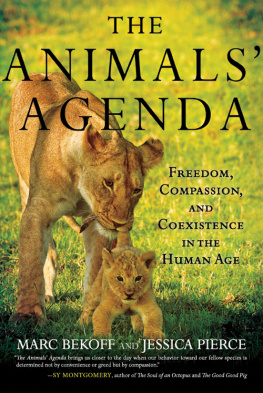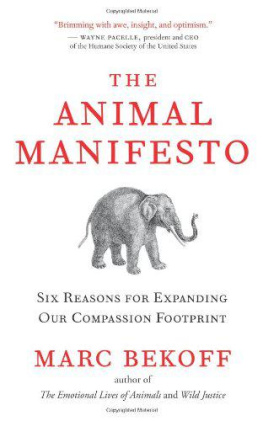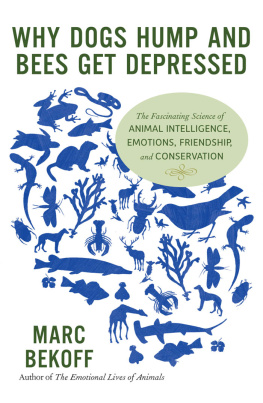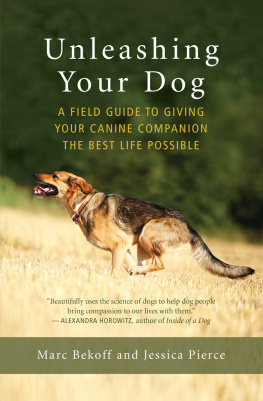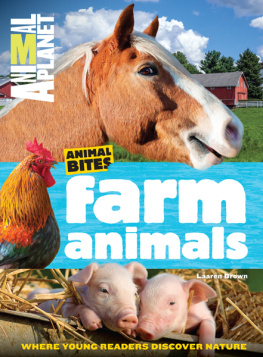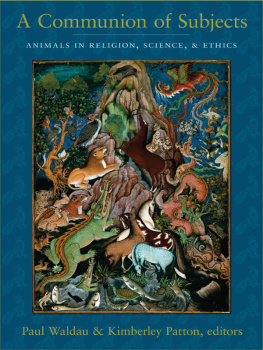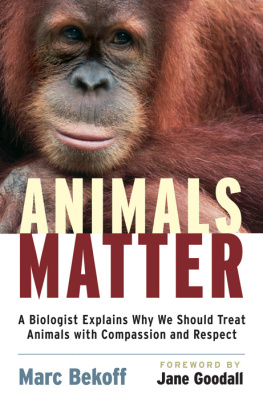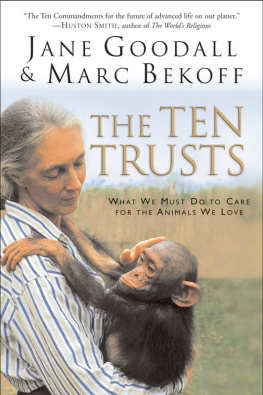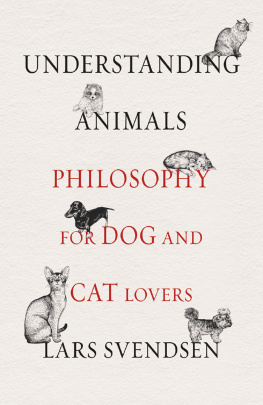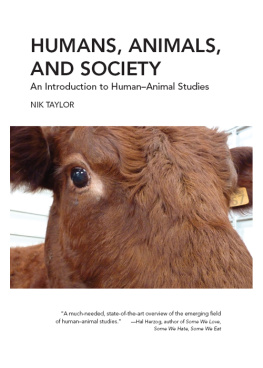MORE PRAISE FOR THE ANIMALS AGENDA
Thoroughly grounded in the history of animal protection, Marc Bekoff and Jessica Pierce have written a manifesto for a science of animal well-being, clearly distinguishing it from the science of animal welfare and articulating a vision for how this new science may inform a world in which humans live in community with their fellow creatures.
D ALE J AMIESON, New York University, professor of environmental studies and philosophy; author of Reason in a Dark Time and coauthor of Love in the Anthropocene
The Animals Agenda upends the ways we grow up treating and demeaning nonhuman animals and their habitats. The well-documented style makes us want to think anew and act anew, to use Abraham Lincolns immortal words. Marc Bekoff and Jessica Pierce make you ponder and extend your own mind and sense of wonder about what the natural world means to us so we can in turn act more sensibly and kindly toward that sine qua non for human existence. The Animals Agenda is a heartening book for all ages.
R ALPH N ADER, author of Animal Envy: A Fable
This book is at the forefront of our evolving understanding, in science and ethics, of what we must do to protect animals in an increasingly human-dominated world.
D ALE P ETERSON, author of The Moral Lives of Animals and Jane Goodall: The Woman Who Redefined Man
My eyes have been opened as never before, and if we long, as I hope we do, for a more balanced and kinder world, welcome this book, as I do, with open arms, minds, and hearts.
V IRGINIA M C K ENNA, founder and trustee, The Born Free Foundation
The call for a science of animal well-being is not only much needed but also long overdue.
K IM S TALLWOOD, author of Growl: Life Lessons, Hard Truths, and Bold Strategies from an Animal Advocate
The Animals Agenda is a bold and important book that everyone should read, argue over, and think about deeply. Not only does this book expose the obscene abuses of factory farms and lab animals, but it tackles deeper, harder, more complex questions as well. Should humans eat animals at all? Do we have the right to confine animals in zoos or aquariums? Is it morally defensible to let our cats roam free, where they will kill native wildlife, or to frustrate their hunting drive by restricting their freedom? People who love animals may come to different conclusionsbut these are questions we should be discussing and debating if ever we are to evolve past the human-centered Anthropocene. The Animals Agenda brings us closer to the day when our behavior toward our fellow species is determined not by convenience or greed but by compassion.
S Y M ONTGOMERY, author of The Soul of an Octopus and The Good Good Pig
The Animals Agenda is a persuasively argued, lucid, and compassionate book that makes a powerful case for animal freedom. Marc Bekoff and Jessica Pierce highlight the crucial difference between animal welfare, which merely aims at minimizing animal suffering while keeping them in miserable conditions and eventually putting them to death, and animal well-being. There is no such thing as happy meat, a happy zoo, or a happy lab. Genuine animal well-being is the freedom from constraints imposed on animals basic aspirations and natural behavior. This wonderful and inspiring book reminds us in particular that we should treat wild animals as our co-citizens on this planet and treat them with respect and protect their natural environment. A must-read by anyone who aspires to morality and justice.
M ATTHIEU R ICARD , author of A Plea for the Animals

On the open plain under a lone acacia tree, a small pride of lionsan older female with three younger membersprotects a precious eight-week-old cub. Each lioness takes on different roles depending on her age and abilities to help ensure the survival of the pride. The cubs mother, the most powerful and experienced hunter, focuses her attention on the passing wildebeest migration while one of the aunties concentrates her energy on babysitting the very precocious and last remaining treasure of the pride.
Jessica dedicates this book to Sage,
who embodies a future of compassion.
Marc dedicates this book to his wonderful
and compassionate parents, who always
stressed the importance of freedom and
supported him as he pursued his dreams
of trying to save the world, although at times
they werent quite sure where he was heading.
CHAPTER 1
Freedom, Compassion, and Coexistence in the Human Age
There comes a time when one must take a position that is neither safe nor politic nor popular, but he must take it because conscience tells him it is right.
Martin Luther King Jr.
News headlines these days often center on animals. Stories seem increasingly to be of two types. The first involves reporting on what might be characterized as the inner lives of animals. Scientists regularly publish new findings on animal cognition or emotion, and these quickly make their way into the popular press. Here is a sampling of some recent headlines:
PIGS POSSESS COMPLEX ETHOLOGICAL TRAITS SIMILAR TO DOGS AND CHIMPANZEES
SQUIRRELS CAN BE DECEPTIVE
CHICKENS ARE SMART, AND THEY UNDERSTAND THEIR WORLD
RATS WILL SAVE THEIR FRIENDS FROM DROWNING... NEW FINDING SUGGESTS THAT THESE RODENTS FEEL EMPATHY
NEW CALEDONIAN CROWS SHOW STRONG EVIDENCE OF SOCIAL LEARNING
ELEPHANTS GET POST-TRAUMATIC STRESS TOO: CALVES ORPHANED BY THE KILLING OF THEIR PARENTS ARE HAUNTED BY GRIEF DECADES LATER
FISH DETERMINE SOCIAL STATUS USING ADVANCED COGNITIVE SKILLS
The other type of news story focuses on individual animals or a particular group of animals who have been wronged by humans in some significant way. These stories often create a social media frenzy, generating both moral outrage and soul-searching. In particular, these stories highlight instances in which the freedom of an animal has been profoundly violated by humans. Some of these recent hot-button stories include the killing of an African lion named Cecil by an American dentist wanting a trophy head; the killing of a mother grizzly bear named Blaze, who attacked a hiker in Yellowstone National Park; the case of a male polar bear named Andy who was suffocating and starving because of an overly tight radio collar placed around his neck by a researcher; the euthanizing and public dissection of a giraffe named Marius at the Copenhagen Zoo because he was not good breeding stock; the ongoing legal battle to assign legal personhood to two research chimpanzees, Leo and Hercules; the exposure of SeaWorld for cruel treatment of orcas, inspired by the tragic story of Tilikum and the documentary Blackfish; and the killing of a gorilla named Harambe at the Cincinnati Zoo, after a small boy fell into the animals enclosure. The fact that these events have created such a stir suggests that we are at a tipping point. People who have never really been active in defense of animals are outraged by the senseless violation of these animals lives and freedom. The growing awareness of animal cognition and emotion has enabled a shift in perspective. People are sick and tired of all the abuse. Animals are sick and tired of it, too.
The Importance of Freedom
Freedom is one of the values we cherish most. Broadly understood, we are free if we are not imprisoned or enslaved, and not unduly coerced or constrained in our choices or actions. Freedom can be difficult to define, but we know when we lose it or when it has been taken from us. Human rights organizations are appropriately concerned when certain groups of people are exploited for their labor, like migrant workers forced into virtual slavery on fishing vessels or toiling in fields for little pay. They are concerned when groups of people are exploited for their bodies, as when young girls are forced into the sex trade. And they are concerned when groups of people are not allowed to move about or speak freely or engage in cultural rituals that are important to them. We also value the freedom to choose our family and friends, to bear and raise children, to think for ourselves, and to work for a decent living. Of course, there is no such thing as pure, unadulterated freedomwe are subject to our unconscious impulses, genetics, unspoken social conventions, and government rules that ensure public safety and order. But we are nonetheless free in important respects. Some measure of freedom is fundamental to human well-being: it provides the substrate for human flourishing.

